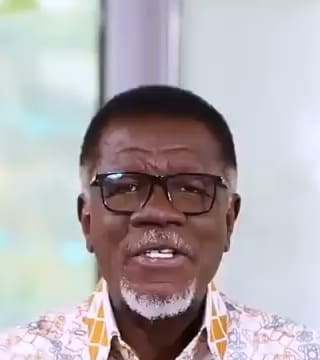Mensa Otabil - A Bold Declaration (11/09/2025)
Exodus Chapter 4, Verses 22 and 23. Then you shall say to Pharaoh, «Thus says the Lord: Israel is my son, my firstborn. So I say to you, 'Let my son go that he may serve me.' But if you refuse to let him go, indeed, I will kill your son, your firstborn.»
This is a very strong declaration that God asked Moses to make when he got to Pharaoh. God sent Moses with specific acts of signs, wonders, and miracles, but he also sent him with specific words to speak. So Moses is not supposed to make up his own words; he’s supposed to speak the specific words that God had put in his mouth when he got to Pharaoh. On the surface, it looks like a natural battle, but this is a spiritual confrontation.
On one side is Pharaoh and the deities of Egypt, the gods of Egypt. On the other side is Israel and Almighty God. It’s a battle for the redemption of the peoples of the earth. Why? Because the plan of redemption included Israel, and the line of redemption was coming from the tribe of Judah, from which Jesus was going to be born. So this is the contention for the soul of humanity, so that humanity will have the chance to experience redemption.
From this, we learn a few things about battles and how we win them, because many of us who know Jesus Christ as Lord are also engaging in battles in life. Sometimes you come against opponents like Egypt that are oppressive, sitting on you, and they are so formidable and mightier than you, and then you wonder how you are going to win this battle. How do I win these battles when I am disadvantaged? Well, we learn something here, and the first thing we learn is that we win when we understand our relationship with God.
That’s the first thing you would notice. God called Israel «my son, my firstborn.» That’s an affectionate term. God is establishing a relationship. It’s because of this relationship that he’s getting involved in this battle. If he didn’t have any relationship with Israel, he wouldn’t be bothered with them. But now he has a relationship with them. He’s in covenant with them. He acts in deliverance because of the relationship. When you have a relationship with God, he acts in covenant relationship with you, comes to your help, rescues you, and delivers you.
So the first lesson we want to learn is to have a relationship with God, because that is why he gets involved in what we’re doing. Israel is my son. The second thing is that we win when we learn to do battle with God’s word. God said to Moses, «When you go, say these words.»
It’s important for us, when we are faced with the challenges of life, to say the word of God. How do we do that? By meditating on the Bible, on the word of God, by hiding his word in our hearts, and by speaking his word out of our mouths. We overcome him by the word of the Lord, our testimony, which is the word of the Lord, and the blood of the Lord Jesus Christ. So in every conflict of life, we have to speak the word of God. Our conversation, our declarations, and our expectations must be woven around the word of God. Because God has a relationship with us, and because we are speaking his word, he backs up his relationship and his word, standing on behalf of his people. That is how God got involved in this battle.
But isn’t it a fearsome thing when God says to Pharaoh, «If you don’t let my son go, I’ll take your son „? Son for son. If you don’t let my son go, I’ll take your son. And he’s not just talking; he’s doing. Because as we find out later, this is exactly how the battle turned out. When it was so difficult for Israel, God came through and delivered them by an outstretched arm. May the Lord deliver you by an outstretched arm in every battle of life, in Jesus' name.
Let’s pray. Say with me, „Heavenly Father, I am yours, and you are mine. Teach me how to speak your words into every situation facing me, in Jesus' name. Amen.“

